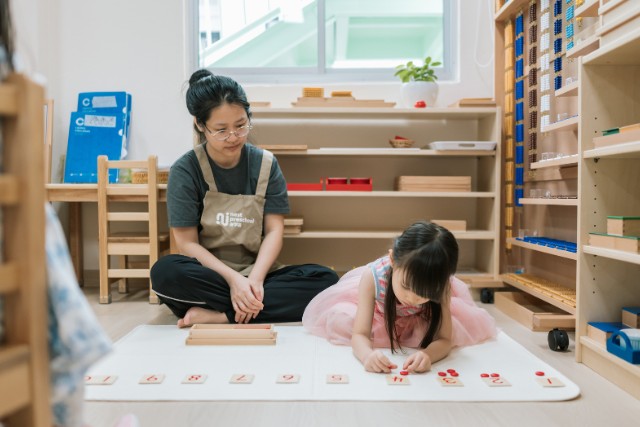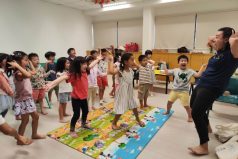Most students will sit for two language subjects, English, and their Mother Tongue, during the PSLE. Attaining fluency in a language is a process that takes time and cannot be ‘studied’ within a short period. Unlike Maths and Science, where the skills and contents lie inside a boundary in the syllabus, anything and everything can appear in a language exam paper.
⇒ Related Read: Prepare Your Child for PSLE English
So even if one were to study intensely for it, there is no guarantee of encountering similar things in the exam papers. Hence, a language test has the widest scope, yet, the amount of revision one can do is probably the least among the PSLE subjects.

There are certain technical aspects where repeated drilling will help. Popular grammar items like the correct verb forms in sentences containing ‘neither’ and ‘either’ or changing a sentence between direct and indirect speech can be perfected with repeated practice. This is already being done during intensive revision in school.
Your child can redo the questions in the worksheets as further reinforcements or learn the correct spelling of past mistakes. But there is a limit to ‘studying’ for the language exams. So, if revision is also needed in the other subjects, it may be more ‘profitable’ to devote time to do revision for those subjects.
Comprehension and cloze passages are more challenging
Language, essentially, is a measure of a person’s ability to understand and communicate effectively. To do this, one must have the grammatical knowledge and vocabulary to form sentences. These proficiencies are tested mainly in the MCQ sections. There is, however, another aspect that is often overlooked.
There must also be a context. The sentence or passage must be about a certain topic and the responses must be based on the same topic too. This is the area where very often, a young child encounters difficulty. These are normally the sections containing an extract of a text, like the cloze passage or the comprehension.

Due to their lack of experiences in life, what may seem obvious to us adults, can be completely foreign to them. Let me illustrate further with this word ‘insurance‘. While we all have a fairly good idea of what insurance is and how it works, this is not the case for children. They do not deal with financial matters at their age so there is little need for them to know what insurance is.
But how does this affect them in a language test? There was once a comprehension passage about the famous Mona Lisa painting. A question asked the respondent to identify the evidence from the passage that the Mona Lisa is a high-value piece of art. The answer lies in the line: “She is one of the most heavily insured women in the world.”
Many of the students knew little about insurance and thus could hardly understand how that line is related to the value of the painting.
Charlie Spiller, Head of Primary Courses from British Council shares his insight on this:
“Unknown language does make this question hard but research would suggest that the bigger problem lies more with general knowledge rather than reading skills. Knowing that the Mona Lisa is one of the world’s most famous and therefore valuable paintings, would have given students background to help them make sense of what they were reading. You can test this whenever you read or listen to the news.
Without knowledge of history, geography and politics, the stories are just words – we use our knowledge to make sense of what we are reading. This is one reason why many schools are designing knowledge rich curriculums to support composition and comprehension skills. At their heart is the belief that the more you know, the easier it is to read and write!”
⇒ Related Read: How To Help Your Child Ace English Comprehension And Composition Writing
Other examples could be financial terms, such as when a business ‘breaks even’, in a passage describing how a businessman had become successful, or even political terms like ‘election’, when talking about a world leader for instance.
Worldly exposure
Sometimes, when children encounter difficulty understanding the cloze or comprehension passages, it is not due to a weak command of the language. The text could be a story set in a culture or time period that they aren’t familiar with.
Imagine reading a story set in a little-known African tribe (if you remember The River Between) or the classics like Oliver Twist, which takes place in the Victorian era in England.
Reading about and trying to picture an unfamiliar culture or place hamper one’s ability to answer the questions or identify suitable words to fill in the blanks with. This is why the more widely read a child is (and in the modern age, dare I say, the more YouTube videos watched), the better this child is able to perform in language exams.
While there isn’t 80 more days to go around the world…
… and learn everything about the world, it will be helpful for your child to be aware of current affairs and general knowledge. This can also be a good break from all the mugging that your child is doing for the PSLE.
Maybe it’s time to consider lifting the TV ban so your child can watch the daily news, which is a good place to start. There are also websites with news reporting tailored for easy reading and understanding, such as News For Kids. The more the input, the better the output.

Be it English or Mother Tongue, the more exposed a child is to what is happening around him or her, the better the ability to grasp the context fully and the fewer blind spots he or she will have, encountering unfamiliar terms during the exam.
The school is doing the technical aspects of revision so there are many other ways parents can support their children at home. I hope you have gained helpful insights while helping to prepare your child for the PSLE during this intense period. I wish your child (and you!) all the best for the PSLE.
By Tan Khee Shian.
* * * * *
Stay in touch! Subscribe to our Telegram here for all our latest updates.
Want to be heard 👂 and seen 👀 by over 100,000 parents in Singapore? We can help! Leave your contact here and we’ll be in touch.



























































